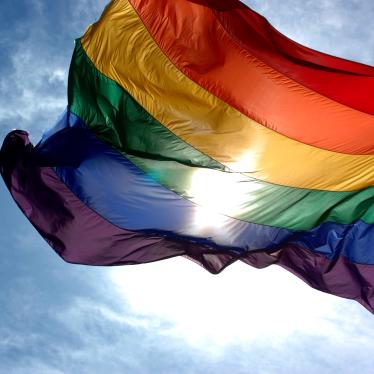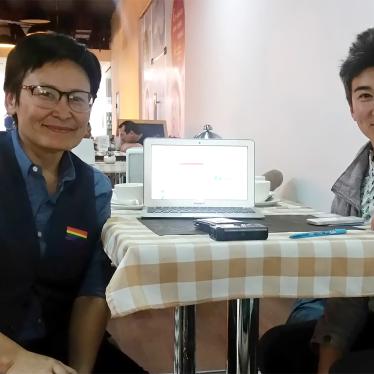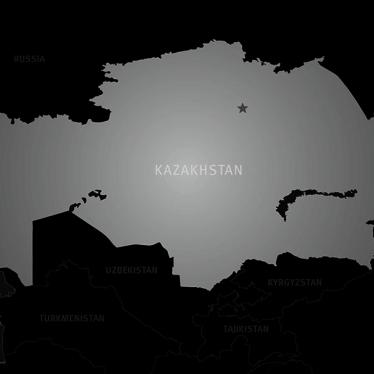(Berlin) – Kazakhstan’s Constitutional Council announced on May 26, 2015, that pending legislation on “propaganda of nontraditional sexual orientation” is unconstitutional, Human Rights Watch said today. The council rejected the discriminatory draft laws because of their vague wording.
“Laws that construe information about sexual orientation as ‘propaganda’ have no place in Kazakhstan,” said Mihra Rittmann, researcher in the Europe and Central Asia division. “Propaganda bills like those that came before Kazakhstan’s council are discriminatory, and should never have been adopted in the first place.”
By rejecting this “propaganda” bill, Kazakhstan’s Constitutional Council set an important precedent against the adoption of discriminatory legislation, Human Rights Watch said.
In February 2015, the draft law “On Protecting Children from Information Harmful to their Health and Development” (the “propaganda” bill) passed the Senate, the upper house of Kazakhstan’s parliament, and was sent along with a second bill amending related legislation to President Nursultan Nazarbaev for signature. The draft legislation had already passed the lower house, the Majilis.
Complete copies of the final drafts were never public. However, according to information available online, the draft laws included a broad ban on the publication or sharing of information relating to same-sex relations in settings where children might be present. In particular, one provision appeared aimed at broadly prohibiting “propagandizing nontraditional sexual orientation” among children.
However the progression of the bills from the Senate to the Constitutional Council was nontransparent. A government website indicates that on April 29, the draft laws were with the Constitutional Council.
The International Covenant on Civil and Political Rights (ICCPR), which Kazakhstan ratified in 2006, requires countries to “respect and to ensure to all individuals within its territory and subject to its jurisdiction the rights recognized in the present Covenant, without distinction of any kind, such as race, colour, sex, language, religion, political or other opinion, national or social origin, property, birth or other status.” In 1994, the United Nations Human Rights Committee, which interprets the covenant, held that “sexual orientation” was protected from discrimination. Kazakhstan’s Constitution also guarantees that “No one shall be subject to discrimination for reasons of … sex, … or any other circumstances.” It also guarantees “freedom of speech and creative activities.”
Kazakhstan is in the process of bidding for the 2022 Olympic Games. In December 2014, Thomas Bach, president of the International Olympic Committee, introduced a series of human rights reforms called “Olympic Agenda 2020,” which require host countries to sign a contract with an anti-discrimination clause – including sexual orientation – and includes protections for human rights, labor, and the environment.
While the government has taken an important step by rejecting the “propaganda” laws, authorities should do more to tackle the persistent climate of homophobia in Kazakhstan, Human Rights Watch said.
In recent years some members of parliament have called for anti-gay legislation. In addition, leaders of the Bolashak (future) movement in September 2014 called on Kazakhstan lawmakers to adopt a law on LGBT “propaganda.” A month later, an Almaty court condoned homophobia and prejudice when it awarded thousands of dollars in damages against an advertising agency for a poster depicting two male cultural icons kissing.
Kazakhstan should also do more to address other areas where it falls short of the Olympic Charter, particularly when it comes to freedom of the media and freedom of assembly, Human Rights Watch said. The government has long imposed tight controls over freedom of expression, and for years has ignored repeated calls to amend a restrictive public assembly law that authorities use regularly in Almaty and elsewhere to justify breaking up peaceful protests.
Over the last few years, Kazakhstan has shut down many critical opposition and independent media outlets, and its abusive handling in 2011 of extended labor strikes, subsequent jailing of labor activists and an outspoken opposition leader, and its recent adoption of a law on trade unions curtail freedom of association.
“As Kazakhstan bids for the Olympics, it should be aware that the eyes of the world will be on how it handles these issues,” Rittmann said. “Kazakhstan should be swiftly moving to end restrictions on fundamental human rights.”







